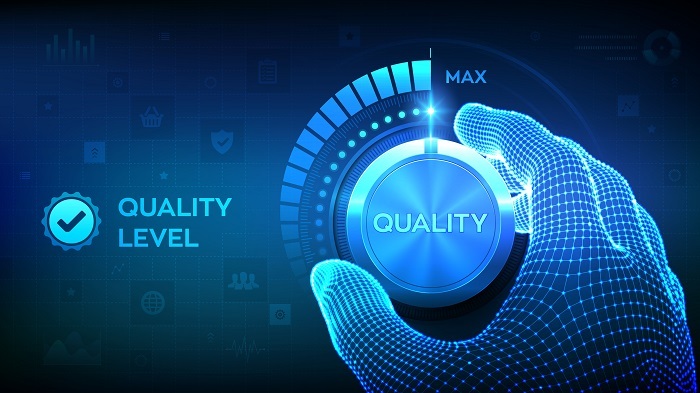
 Data Structure
Data Structure Networking
Networking RDBMS
RDBMS Operating System
Operating System Java
Java MS Excel
MS Excel iOS
iOS HTML
HTML CSS
CSS Android
Android Python
Python C Programming
C Programming C++
C++ C#
C# MongoDB
MongoDB MySQL
MySQL Javascript
Javascript PHP
PHP
- Selected Reading
- UPSC IAS Exams Notes
- Developer's Best Practices
- Questions and Answers
- Effective Resume Writing
- HR Interview Questions
- Computer Glossary
- Who is Who
What is the Role of Continuous Learning in Quality Management?
Continuous learning is essential for professionals to stay relevant and competitive in today's fast-paced business environment. This is especially true for quality management professionals who must stay current with industry standards, technologies, and customer expectations. This article discusses the significance of continuous learning in quality management and how it can assist organizations in improving their processes, outcomes, and overall quality.

It also discusses the key benefits of continuous learning for quality management professionals, as well as the challenges they may face when putting it into practice. Finally, the article offers practical advice for incorporating continuous learning into your quality management system and improving the performance of your organization.
The Importance of Continuous Learning in Quality Management
Continuous learning is an essential component of quality management. It means that quality management professionals should never stop learning and upgrading their skills in order to keep up with new developments and technologies in the industry.
According to an American Society for Quality (ASQ) survey, organizations that prioritize continuous learning have a 65% higher rate of customer satisfaction and a 46% higher rate of overall quality than those that do not prioritize continuous learning.
This statistic demonstrates the importance of continuous learning in achieving high levels of quality and customer satisfaction. It enables quality management professionals to stay current with technological advances, industry trends, and customer expectations, and to make informed decisions that benefit their organizations.
Continuous Improvement in Quality Management Through Learning

Continuous quality management improvement through learning implies that organizations strive to improve their processes and outcomes by constantly acquiring new knowledge and skills. Companies can improve the quality of their products or services and gain a competitive advantage in the market by investing in learning and development.
Organizations that invest in employee development have a 24% higher profit margin than those that do not, according to a survey conducted by the Association for Talent Development. This demonstrates the importance of continuous learning in improving a business's overall quality.
Organizations can identify and address areas for improvement in their processes, reduce waste and errors, and increase customer satisfaction by regularly training their employees. It also assists employees in staying current on industry trends and best practices, which can lead to innovation and improved performance.
How Continuous Learning Can Help Drive Quality Management Success?
Continuous learning is critical to the success of quality management. It is the continuous process of acquiring new knowledge, skills, and abilities in order to improve one's performance and achieve better results.
Continuous learning is essential in quality management for staying current with industry standards, technologies, and best practices. Individuals and organizations can identify and address potential problems before they become major issues by continuously learning and adapting, resulting in improved quality and customer satisfaction.
Continuous learning also assists individuals and organizations in remaining innovative and competitive. They can develop new products, services, and processes to meet changing customer needs and market demands by broadening their knowledge and skills. As a result, efficiency, productivity, and profitability improve.
Key Benefits of Continuous Learning for Quality Management Professionals
Quality Management professionals can reap significant benefits from engaging in continuous learning. To begin with, it enhances their problem-solving skills, making it easier for them to recognize and deal with issues as they arise. Second, it allows them to keep up with the ever-changing regulations and standards, guaranteeing that their business always meets the benchmarks of its sector.
Continuous learning also enables Quality Management professionals to enhance their communication skills, which are essential for collaborating effectively with coworkers and stakeholders. It also helps them become more flexible and adaptable, which is useful in a fast-paced work environment.
Finally, participating in Quality Management-related continuing education is an excellent way to maintain enthusiasm for and dedication to your work. By constantly seeking out new challenges and opportunities to learn and grow, professionals can maintain their enthusiasm for their work and continue to contribute significantly to their organizations.
Adopting a Continuous Learning Mindset to Enhance Quality Management Practices
Adopting a mindset of continuous learning is critical for improving quality management practices. This entails constantly acquiring new knowledge and skills in order to improve how we manage quality. We can stay up to date with the latest practices and technologies and identify areas for improvement by constantly learning.
Attending workshops, reading books, or taking online courses are all examples of continuous learning. It may also entail soliciting feedback from coworkers or customers and acting on that feedback to make improvements.
We can improve our ability to identify and prevent quality issues, as well as respond quickly when they do occur, by adopting a continuous learning mindset. This can result in improved products and services, higher customer satisfaction, and, ultimately, better business performance.
Overcoming Challenges to Implementing Continuous Learning in Quality Management
Quality management relies heavily on a culture of continuous learning. This suggests that professionals in this field would benefit from a commitment to lifelong education. On the other hand, putting Continuous Learning into practice can be tricky. Challenges include assessing training's efficacy, overcoming employee resistance to change, and acquiring necessary resources.
Overcoming these obstacles requires a well-defined strategy for Continuous Learning, adequate resources and support, and the active participation of employees. It is also crucial to monitor and assess the results of your Continuous Learning initiatives. In order to enhance their quality management processes and generate better results, businesses must first overcome these challenges.
Integrating Continuous Learning into Your Quality Management System
Integrating continuous learning into your quality management system entails ensuring that your employees are constantly learning and improving their skills in order to better meet your organization's quality standards. This can include offering training opportunities, encouraging knowledge-sharing among team members and reviewing and updating your quality management processes on a regular basis to reflect new learnings and best practices. You can help your organisation stay competitive and provide high-quality products or services to your customers by prioritizing continuous learning.

